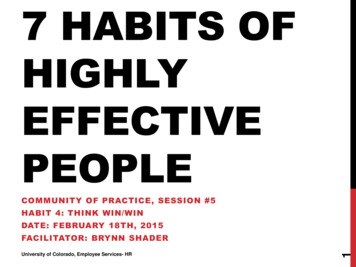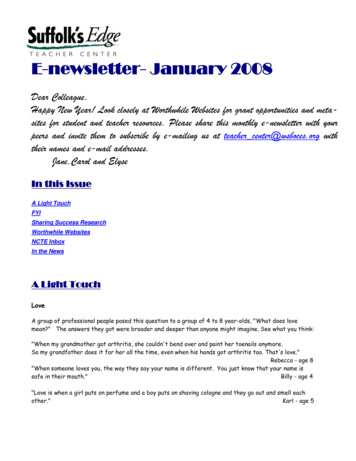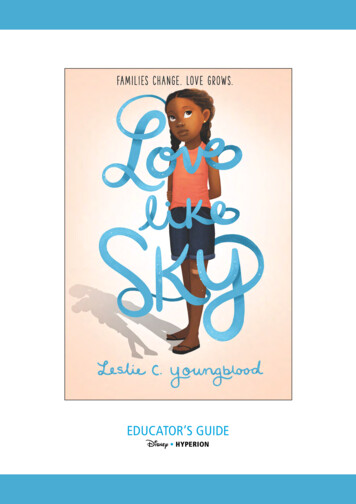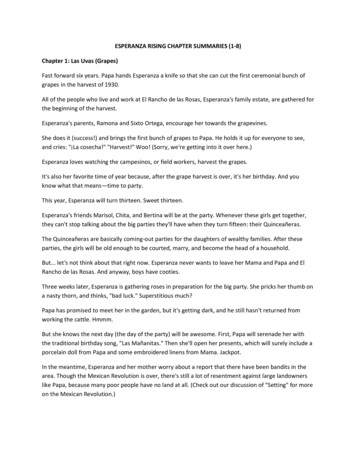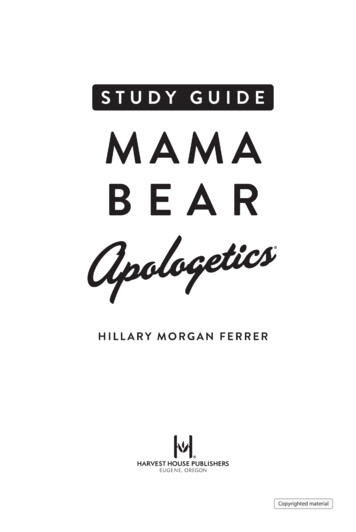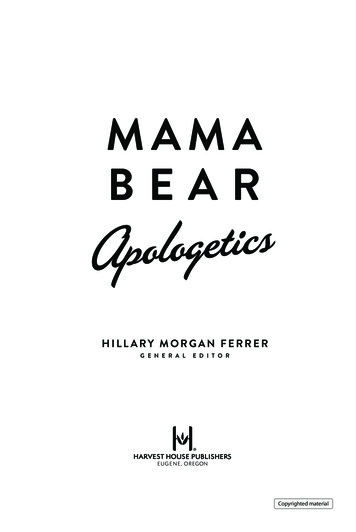
Transcription
For Mama Win, Mommy, Nikki, Shani, and Dawnthe women who helped shape my journey to manhood
ContentsIntroductionPART I: FATHERS AND ANGELS1. Is Daddy Coming with Us?2. In Search of Home3. Foreign GroundPART II: CHOICES AND SECOND CHANCES4. Marking TerritoryPhoto Insert 15. Lost6. HuntedPART III: PATHS TAKEN AND EXPECTATIONS FULFILLED7. The Land That God Forgot8. SurroundedPhoto Insert 2EpilogueAfterwordA Call to Action by Tavis SmileyResource GuideAcknowledgments
Reader’s Guide
IntroductionThis is the story of two boys living in Baltimore with similar histories and an identicalname: Wes Moore. One of us is free and has experienced things that he never evenknew to dream about as a kid. The other will spend every day until his death behindbars for an armed robbery that left a police o cer and father of ve dead. Thechilling truth is that his story could have been mine. The tragedy is that my storycould have been his. Our stories are obviously specific to our two lives, but I hope theywill illuminate the crucial in ection points in every life, the sudden moments ofdecision where our paths diverge and our fates are sealed. It’s unsettling to know howlittle separates each of us from another life alogether.In late 2000, the Baltimore Sun published a short article with the headline “LocalGraduate Named Rhodes Scholar.” It was about me. As a senior at Johns HopkinsUniversity, I received one of the most prestigious academic awards for students in theworld. That fall I was moving to England to attend Oxford University on a fullscholarship.But that story had less of an impact on me than another series of articles in the Sun,about an incident that happened just months before, a precisely planned jewelry storerobbery gone terribly wrong. The store’s security guard—an o -duty police o cernamed Bruce Prothero—was shot and killed after he pursued the armed men into thestore’s parking lot. A massive and highly publicized manhunt for the perpetratorsensued. Twelve days later it ended when the last two suspects were apprehended in ahouse in Philadelphia by a daunting phalanx of police and federal agents. The articlesindicated that the shooter, Richard Antonio Moore, would likely receive the deathpenalty. The sentence would be similarly severe for his younger brother, who was alsoarrested and charged. In an eerie coincidence, the younger brother’s name was thesame as mine.Two years after I returned from Oxford, I was still thinking about the story. Icouldn’t let it go. If you’d asked me why, I couldn’t have told you exactly. I was struckby the super cial similarities between us, of course: we’d grown up at the same time,on the same streets, with the same name. But so what? I didn’t think of myself as asuperstitious or conspiratorial person, the kind who’d obsess over a coincidence untilit yielded meaning. But there were nights when I’d wake up in the small hours andnd myself thinking of the other Wes Moore, conjuring his image as best I could, aman my age lying on a cot in a prison cell, burdened by regret, trying to sleepthrough another night surrounded by the walls he’d escape only at death. Sometimesin my imaginings, his face was mine.There’s a line at the opening of John Edgar Wideman’s brilliant Brothers andKeepers about the day he found out his own brother was on the run from the police foran armed robbery: “The distance I’d put between my brother’s world and mine
suddenly collapsed Wherever he was, running for his life, he carried part of me withhim.” But I didn’t even know the other Wes Moore. Why did I feel this connection withhim, why did I feel like he “carried part of me with him” in that prison cell? I worriedthat I was just being melodramatic or narcissistic. But still, I couldn’t shake it. Finally,one day, I wrote him a simple letter introducing myself and explaining how I’d cometo learn about his story. I struggled to explain the purpose of my letter and posed aseries of naïve questions that had been running through my mind: Who are you? Doyou see your brother? How do you feel about him? How did this happen? As soon as Imailed the letter, the crazy randomness of it all came ooding in on me. I was surethat I’d made a mistake, that I’d been self-indulgent and presumptuous and insulting,and that I’d never hear back from him.A month later, I was surprised to nd an envelope in my mailbox stamped with apostmark from the Jessup Correctional Institution in Maryland. He had written back.“Greetings, Good Brother,” the letter started out:I send salutations of peace and prayers and blessings and guidance to you forposing these questions, which I’m going to answer, Inshallah. With that, I willbegin with the first question posed This was the start of our correspondence, which has now gone on for years. At thebeginning of our exchange of letters—which was later expanded by face-to-face visitsat the prison—I was surprised to nd just how much we did have in common, asidefrom our names, and how much our narratives intersected before they fatefullydiverged. Learning the details of his story helped me understand my own life andchoices, and I like to think that my story helped him understand his own a little more.But the real discovery was that our two stories together helped me to untangle someof the larger story of our generation of young men, boys who came of age during ahistorically chaotic and violent time and emerged to succeed and fail inunprecedented ways. After a few visits, without realizing it, I started working on thisproject in my mind, trying to gure out what lessons our stories could o er to thenext wave of young men who found themselves at the same crossroads we’dencountered and unsure which path to follow.Perhaps the most surprising thing I discovered was that through the stories wevolleyed back and forth in letters and over the metal divider of the prison’s visitingroom, Wes and I had indeed, as Wideman wrote, “collapsed the distance” between ourworlds. We de nitely have our disagreements—and Wes, it should never be forgotten,is in prison for his participation in a heinous crime. But even the worst decisions wemake don’t necessarily remove us from the circle of humanity. Wes’s desire toparticipate in this book as a way to help others learn from his story and choose adifferent way is proof of that.To write this book, I conducted hundreds of hours of interviews with Wes and hisfriends and family, as well as my friends and family. The stories you will read arerendered from my own memory and the best memories of those we grew up with,
lived with, and learned from. I engaged in extensive historical research andinterviewed teachers and drug dealers, police o cers and lawyers, to make sure I gotthe facts—and the feel—right. Some names have been changed to protect people’sidentities and the quiet lives they now choose to lead. A few characters arecomposites. But all of the stories are painstakingly real.The book is broken up into eight chapters, corresponding to eight years that had adecisive impact on our respective lives. The three parts represent the three majorphases in our coming of age. Opening each of these parts is a short snippet ofconversation between Wes and me in the prison’s visitors’ room. It was veryimportant to me that we return again and again to that visitors’ room, the in-betweenspace where the inside and the outside meet. I don’t want readers to ever forget thehigh stakes of these stories—and of all of our stories: that life and death, freedom andbondage, hang in the balance of every action we take.The book also features a resource guide listing more than two hundred “ElevateOrganizations” that young readers, their caregivers, and anyone who wants to helpcan use as a tool for creating positive change. One of the true joys of this project hasbeen learning about and creating bonds with some of the organizations that are onthe front lines of serving our nation’s youth.It is my sincere hope that this book does not come across as self-congratulatory orself-exculpatory. Most important, it is not meant in any way to provide excuses forthe events of the fateful day February 7, 2000. Let me be clear. The only victims thatday were Sergeant Bruce Prothero and his family. Rather, this book will use our twolives as a way of thinking about choices and accountability, not just for each of us asindividuals but for all of us as a society. This book is meant to show how, for those ofus who live in the most precarious places in this country, our destinies can bedetermined by a single stumble down the wrong path, or a tentative step down theright one.This is our story.
PART I
Fathers and AngelsWes stared back at me after I’d asked my question, letting a moment pass and a smirk ickeracross his face before responding.“I really haven’t thought too deeply about his impact on my life because, really, he didn’thave one.”Wes leaned back in his seat and threw an even stare at me.“Come on, man,” I pressed on. “You don’t think about how things would have beendifferent if he’d been there? If he cared enough to be there?”“No, I don’t.” The lower half of his face was shrouded by the long beard that he’d grown, anoutward sign of the Islamic faith he’d adopted in prison. His eyes danced with bemusement.He was not moved by my emotional questioning. “Listen,” he went on. “Your father wasn’tthere because he couldn’t be, my father wasn’t there because he chose not to be. We’re goingto mourn their absence in different ways.”This was one of our rst visits. I had driven a half hour from my Baltimore home into thewoody hills of central Maryland to Jessup Correctional Institution to see Wes. Immediatelyupon entering the building, I was sternly questioned by an armed guard and searched toensure I wasn’t bringing in anything that could be passed on to Wes. Once I was cleared,another guard escorted me to a large room that reminded me of a public school cafeteria. Thiswas the secured area where prisoners and their visitors came together. Armed guardssystematically paced around the room. Long tables with low metal dividers separating thevisitors from the visited were the only furnishings. The prisoners were marched in, dressed inorange or blue jumpsuits, or gray sweat suits with “DOC” emblazoned across the chests. Theuniforms reinforced the myriad other signals around us: the prisoners were owned by thestate. Lucky inmates were allowed to sit across regular tables from loved ones. They couldexchange an initial hug and then talk face-to-face. The rest had to talk to their families andfriends through bulletproof glass using a telephone, visitor and prisoner connected by receiversthey held tight to their ears.Just as I was about to ask another question, Wes interrupted me.“Let me ask you a question. You come here and ask me all these questions, but you haven’tshared any of yourself up with me. So tell me, what impact did your father not being therehave on your childhood?”“I don’t know—” I was about to say more when I realized that I didn’t really have more tosay.“Do you miss him?” he asked me.“Every day. All the time,” I replied softly. I was having trouble nding my voice. It alwaysamazed me how I could love so deeply, so intensely, someone I barely knew.I was taught to remember, but never question. Wes was taught to forget, and never ask why.We learned our lessons well and were showing them o to a tee. We sat there, just a few feet
from each other, both silent, pondering an absence.
ONEIs Daddy Coming with Us?1982Nikki and I would play this game: I would sit on the living room chair while Nikkideeply inhaled and then blew directly in my face, eliciting hysterical laughs on bothsides. This was our ritual. It always ended with me jabbing playfully at her face. She’drun away and bait me to give chase. Most times before today I never came close tocatching her. But today, I caught her and realized, like a dog chasing a car, I had noidea what to do. So, in the spirit of three-year-old boys everywhere who’ve run out ofbetter ideas, I decided to punch her. Of course my mother walked into the room right asI swung and connected.The yell startled me, but her eyes are what I remember.“Get up to your damn room” came my mother’s command from the doorway. “I toldyou, don’t you ever put your hands on a woman!”I looked up, confused, as she quickly closed the distance between us. My mother hadwhat we called “Thomas hands,” a tag derived from her maiden name: hands that hit sohard you had to be hit only once to know you never wanted to be hit again. Thenickname began generations ago, but each generation took on the mantle of justifyingit. Those hands were now reaching for me. Her eyes told me it was time to get moving.I darted up the stairs, still unsure about what I’d done so terribly wrong. I headed tothe bedroom I shared with my baby sister, Shani. Our room was tiny, barely big enoughfor my small bed and her crib. There was no place to hide. I was running in circles,frantic to nd a way to conceal myself. And still trying to comprehend why I was in somuch trouble. I couldn’t even gure out the meaning of half the words my mother wasusing.In a panic, I kicked the door shut behind me just as her voice reached the second oor.“And don’t let me hear you slam that—” Boom! I stared for a moment at the closed door,knowing it would soon be ying open again. I sat in the middle of the room, next to mysister’s empty crib, awaiting my fate.Then, deliverance.“Joy, you can’t get on him like that.” My father’s baritone voice drifted up through thethin oor. “He’s only three. He doesn’t even understand what he did wrong. Do youreally think he knows what a woman beater is?”My father was in the living room, ten feet from where the incident began. He was avery slender six foot two with a bushy mustache and a neatly shaped afro. It wasn’t hisstyle to yell. When he heard my mother’s outburst, he rose from his chair, his eyes
widening in confusion. My mother slowly reeled herself in. But she wasn’t completelymollified.“Wes, he needs to learn what is acceptable and what is not!” My father agreed, butwith a gentle laugh, reminded her that cursing at a young boy wasn’t the most e ectiveway of making a point. I was saved, for the moment.My rst name, Westley, is my father’s. I have two middle names, a compromise betweenmy parents. My father loved the sound and meaning of Watende, a Shona word thatmeans “revenge will not be sought,” a concept that aligned with his gentle spirit. Mymother objected. Watende sounded too big, too complicated for such a tiny baby. Itwasn’t until later in life that she understood why it was so important to my father thatWatende be a part of me. Instead, she lobbied for Omari, which means “the highest.” I’mnot sure what was easier or less lofty about that name, but I was well into elementaryschool before I became comfortable spelling either.My parents’ debate continued downstairs, but their words faded. I went to the room’sonly window and looked out on the world. My older sister, Nikki, and I loved to lookthrough the window as families arrived at the swap market across the street. Our homewas on a busy street that sat right on the border of Maryland and Washington, D.C.,stuck confusingly between two di erent municipal jurisdictions, a fact that wouldbecome very signi cant in the near future. I pulled back the thin diaphanous curtainthat covered the windows and spotted my friend Ayana outside with her mother. Shewas half Iranian and half Italian, with long, dark hair and warm eyes that alwaysfascinated me. They were light green, unlike the eyes of anyone else I knew, and theytwinkled as if they held stars. I wanted to tap on the window to say hello as she walkedpast our house to the tenement building next door. But I was afraid of making moretrouble for myself, so I just smiled.On the dresser by the window sat a framed picture of me with Nikki. I sat on her lapwith my arm wrapped around her neck, a goofy smile on my face. Nikki is seven yearsolder, so in the picture she was nine and I was barely two. Colorful beads capped thebraided tips of her hair, a style she shared with my mother, and large, black-framedeyeglasses covered half of her face.Nikki’s real name was Joy, like my mom’s, but everyone called her Nikki. My motherwas obsessed with the poet Nikki Giovanni, in love with her unabashed femininestrength and her reconciliation of love and revolution. I spent nearly every wakingmoment around Nikki, and I loved her dearly. But sibling relationships are often fraughtwith petty tortures. I hadn’t wanted to hurt her. But I had.At the time, I couldn’t understand my mother’s anger. I mean this wasn’t really awoman I was punching. This was Nikki. She could take it. Years would pass before Iunderstood how that blow connected to my mom’s past.My mother came to the United States at the age of three. She was born in Lowe River in
the tiny parish of Trelawny, Jamaica, hours away from the tourist traps that line thecoast. Its swaths of deep brush and arable land made it great for farming but lessappealing for honeymoons and hedonism. Lowe River was quiet, and remote, and it washome for my mother, her older brother Ralph, and my grandparents. My maternalgreat-grandfather Mas Fred, as he was known, would plant a coconut tree at his homein Mount Horeb, a neighboring area, for each of his kids and grandkids when they wereborn. My mom always bragged that hers was the tallest and strongest of the bunch. Theland that Mas Fred and his wife, Miss Ros, tended had been cared for by our ancestorsfor generations. And it was home for my mom until her parents earned enough moneyto bring the family to the States to ful ll my grandfather’s dream of a theology degreefrom an American university.When my mom rst landed in the Bronx, she was just a small child, but she was asurvivor and learned quickly. She studied the other kids at school like an anthropologist,trying desperately to t in. She started with the way she spoke. She diligently listened tothe radio from the time she was old enough to turn it on and mimicked what she heard.She’d always pull back enough in her interactions with her classmates to give herselfroom to quietly observe them, so that when she got home she could practice imitatingtheir accents, their idiosyncrasies, their style. Words like irie became cool. Constablebecame policeman. Easy-nuh became chill out. The melodic, swooping movement of herJamaican patois was quickly replaced by the more stable cadences of American English.She jumped into the melting pot with both feet.Joy Thomas entered American University in Washington, D.C., in 1968, a year whenshe and her adopted homeland were both experiencing volatile change—Vietnam, aseries of assassinations, campus unrest, rioting that tore through the nation’s cities, andan American president who no longer wanted the job. Joy herself was caught betweenloving the country that o ered her and her family new opportunities and beingfrustrated with that country because it still made her feel like a second-class citizen.At college, Joy quickly fell in with the OASATAU, the very long acronym for a veryyoung group, the Organization of African and African-American Students at theAmerican University. The OASATAU was rallying AU’s black students into engagementwith the national, international, and campus issues roiling around them. The battlingorganization elevated her consciousness beyond her assimilationist dreams and sparkeda passion for justice and the good fight.A charismatic AU junior named Bill was the treasurer of OASATAU, and two monthsafter they met early in the exciting whirlwind of her freshman year, Joy was engaged tomarry him. Despite the quick engagement, they waited two years to get married, bywhich time Joy was a junior and Bill a recent graduate looking for work. Marriagebrought the sobering realities of life into focus. The truth was, they were both still tryingto find their feet as adults and feeling a little in over their heads as a married couple.As the love haze wore o , Joy began to see that the same qualities that had made Billso attractive as a college romance—his free and rebellious spirit, his nearly paralyzingcontempt for “the Man”—made him a completely unreliable husband. And she
discovered that what she had foolishly thought of as his typical low-level recreationaldrug use was really something much worse. In a time of drug experimentation andexcess, Bill was starting to look like a casualty.As the years passed, Joy kept hoping that Bill’s alcohol and drug use would fade. Shewas caught in a familiar trap for young women and girls—the fantasy that she alonecould change her man. So she doubled down on the relationship. They had a childtogether. She hoped that would motivate Bill to make some changes. But his addictionjust got worse, and the physical, mental, and emotional abuse he unleashed becamemore intense.One night things came to a head. Bill came home and started to badger Joy aboutwashing the dishes. His yelling threatened to wake up one-year-old Nikki, and Joy triedto shush him. He kept yelling. He moved in on her. The two of them stood face-to-face,him yelling, her pleading with him in hushed tones to lower his voice.He grabbed her by the shoulders and threw her down. She sprawled on the oor in herwhite T-shirt and blue AU sweatpants, stunned but not completely surprised by hisexplosive reaction. He wasn’t done. He grabbed her by her T-shirt and hair, and startedto drag her toward the kitchen. He hit her in the chest and stomach, trying to get her tomove her arms, which were now defensively covering her head. Finally, she snapped.She screamed at him without fear of waking Nikki as he dragged her across the parquetfloor. She kicked and scratched at his hands.Bill was too strong, too determined, too high. Her head slammed against thedoorframe as he nally dragged her body onto the kitchen’s linoleum oor. He releasedher hair and her now-ripped T-shirt and once again ordered her to wash the dishes. Hestood over her with a contemptuous scowl on his face. It could’ve been that look. Or itcould’ve been the escalating abuse and the accumulated frustration at the chaotic life hewas creating for her and her daughter. But something gave Joy the strength to pullherself up from the oor. On top of the counter was a wooden block that held all of thelarge, sharp knives in the kitchen. She pulled the biggest knife from its sheath andpointed the blade at his throat. Her voice was collected as she made her promise: “If youtry that shit again, I will kill you.”Bill seemed to suddenly regain his sobriety. He backed out of the kitchen slowly, nottaking his eyes from his wife’s tear-drenched face. Her unrelenting stare. They didn’tspeak for the rest of the night. One month later, Joy and Nikki were packed up.Together, they left Bill for good.My mom vowed to never let another man put his hands on her. She wouldn’t tolerateit in others either.My parents nished their conversation, and it was obvious that one of them washeading up to speak to me. I turned from the window and stood in the middle of theroom, mentally running through my nonexistent options for escape.Soon I could tell by the sound of the steps it was my father. His walk was slower,heavier, more deliberate. My mother tended to move up the stairs in a sprint. He lightly
knocked on the door and slowly turned the knob. The door opened slightly, and hepeeked in. His easy half smile, almost a look of innocent curiosity, assured me that, atleast for now, the beating would wait.“Hey, Main Man, do you mind if I come in?” I’m told that he had many terms ofendearment for me, but Main Man is the one I remember. I didn’t even look up butnodded slowly. He had to duck to clear the low doorway. He picked me up and, as hesat on the bed, placed me on his lap. As I sat there, all of my anxiety released. I couldnot have felt safer, more secure. He began to explain what I did wrong and why mymother was so angry. “Main Man, you just can’t hit people, and particularly women.You must defend them, not fight them. Do you understand?”I nodded, then asked, “Is Mommy mad at me?”“No, Mommy loves you, like I love you, she just wants you to do the right thing.”My father and I sat talking for another ve minutes before he led me downstairs toapologize to my sister, and my mother. With each tiny step I took with him, my wholehand wrapped tighter around his middle nger. I tried to copy his walk, his expressions.I was his main man. He was my protector.That is one of only two memories I have of my father.The other was when I watched him die.My dad was his parents’ only son. Tall but not physically imposing, he dreamed of beingon television—having a voice that made an impact. Armed with an insatiable desire tosucceed—and aided by his natural gifts, which included a deeply resonant voice—hemade his dream come true soon after finishing up at Bard College in 1971.As a young reporter, he went to many corners of the country, following a story or, inmany cases, following a job. After stints in North Carolina, New York, Florida, Virginia,California, and a handful of other states, he returned home to southern Maryland andstarted work at a job that would change his life. He nally had the chance to host hisown public affairs show. And he’d hired a new writing assistant. Her name was Joy.Their working relationship evolved quickly into courtship, then love. She appreciatedthis up-and-coming reporter and the professional partnership they shared. Wes wascalm, reassuring, hardworking, and sober. In other words, the antithesis of Bill. Wes wasintensely attracted to this short woman with a broad smile who mixed a steel backbonewith Caribbean charm. And he loved Nikki. Despite her not being his own child, heforged a sincere friendship and, eventually, an unbreakable bond with Nikki. It allbecame o cial when my mother and father married in a small ceremony inWashington, D.C. I entered the world two years later.On April 15, 1982, my father ended his radio news broadcast on WMAL, a stalwart inthe Washington, D.C., market, with his traditional sign-o —“This is Wes Moore, thanksagain, and we’ll talk next time”—as the on-air light faded to black. His smile was hidingthe fact that for the past twelve hours he’d been feeling ill. His every breath was astruggle.He came home to the smell of his favorite meal, smothered lamb chops. It was almost
midnight and we kids were already in bed, but my parents stayed up, sat together, andate. That night he couldn’t get to sleep. He tried taking Tylenol, hoping it would help hissevere sore throat and fever, but the pill lodged in his throat, refusing to dissolve. At7:00 A.M., he woke my mother to tell her he thought he should go to the hospital. Hethrew on a tattered blue annel shirt and a pair of worn blue jeans. He got in his redVolkswagen Rabbit and drove himself to the hospital. After my mother took Nikki toschool and dropped Shani and me o with the babysitter, she rushed to meet my father.In the emergency room, she was shocked by the disoriented man before her. My fathercould not keep his eyes open. His head opped from side to side. The doctors thoughtthe cause of his discomfort was a sore throat and blamed his lack of neck control on alack of sleep. To reduce the pain, they anesthetized his throat. In retrospect, that wasthe worst thing they could have done. He could no longer feel it closing.The doctors didn’t know what to make of his symptoms. They questioned my motherabout my father’s medical history, then shifted to questions about his mental state.“Does he have a habit of exaggerating?” “Is there anything going on in his life thatwould force him to make up symptoms?”At 4:40 P.M., my father was released from the hospital and told to get some rest athome.By six that evening, my mother was in the kitchen with Nikki, holding Shani as shecooked potato pancakes for our dinner. I sat at the dining room table adding colors tothe black-and-white clown in my coloring book. I was months away from my fourthbirthday. I heard my father coming down the stairs. His steps were slower than usual. Igot up from the chair so I could be picked up as soon as he reached the rst oor. Then Iheard a crash.His body was sprawled and writhing at the foot of the stairs. Hardly any sounds camefrom his mouth. I heard another crash, this one from the kitchen. The clattermomentarily stole my attention from my father. My mother heard his collapse and, inher rush to see what had happened, dropped the sizzling cast-iron skillet and potatopancakes on the oor. I looked back up to my father and saw him gasping for air,holding his throat. His normally strong features sagged in exhaustion, as if he were inthe nal hours of a battle he had been ghting for years. I stared at him, looking butdoing nothing.Mommy pushed past me and told Nikki to call 911. Nikki rushed to the phone andbegan speaking with the emergency personnel on the other end. I could hear herrepeating again and again: “I don’t know what county we’re in.” Minutes passed. Shaniwas crying hysterically. My mother attended to my father, improvising her own versionof CPR while also minding Shani. My baby sister’s screams only seemed to get louder.And I just stood there, staring.Finally my mother told me to go outside with Nikki and guide the ambulance crew in.My older sister took my hand and led me out to wait. Minutes later, police andambulance crews arrived. Nikki ordered me to stay outside while she led them into ourhome.At this point my memories get less distinct. It was like standing in a eld when a
powerful gust of wind suddenly blows: everything around you vanishes, all you hear isthe wind filling your ears, all you feel is the wind on your skin. Your eyes tear, and sightblurs. Your mind all but empties.I stayed outside with the collection of neighbors who had come to see what was goingon. Through my
world. That fall I was moving to England to attend Oxford University on a full scholarship. But that story had less of an impact on me than another series of articles in the Sun, about an incident that happened just months before, a precisely planned jewelry store robbery gone terribly w

